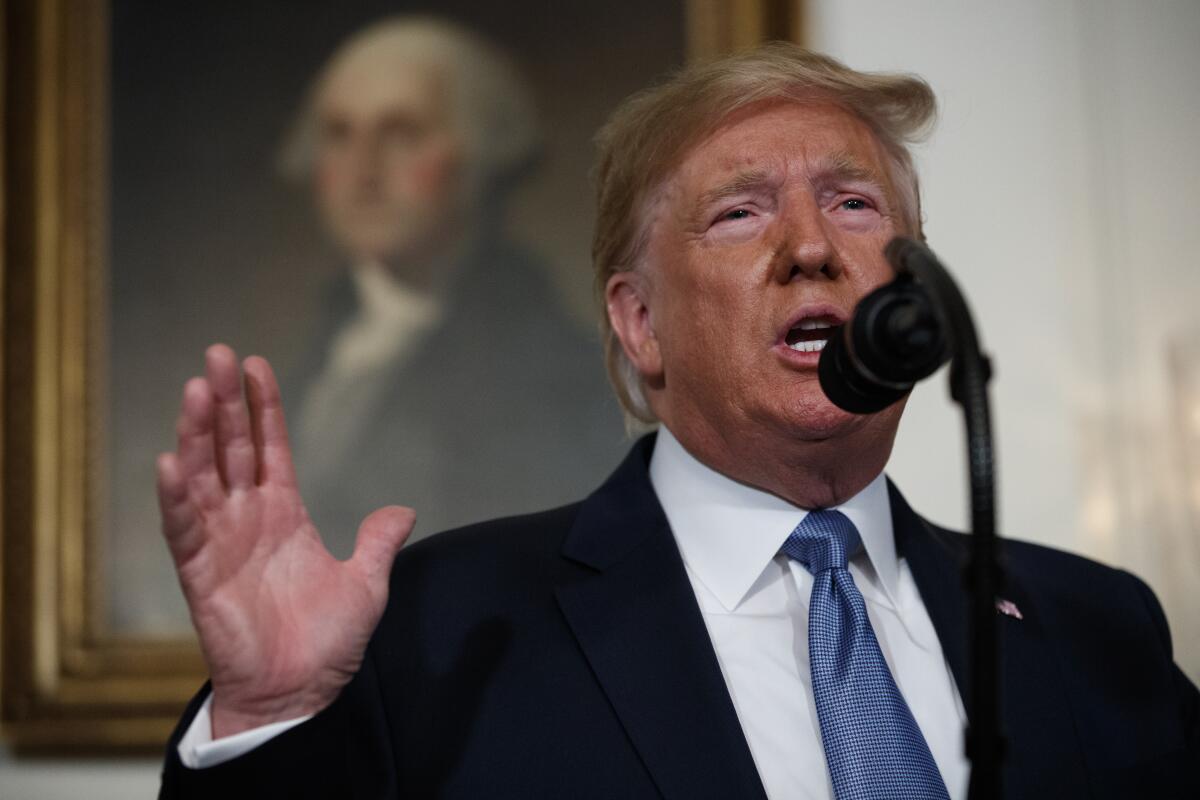Trump’s cynical response to mass shootings falls far short of what’s needed to protect the U.S.

- Share via
After a weekend of numbing carnage — more than 30 dead and more than 50 injured in mass shootings in El Paso and Dayton, Ohio, — President Trump stepped forward Monday morning with a tweet calling for a bilateral embrace of “strong background checks,” whatever that means, and “perhaps marrying this legislation with desperately needed immigration reform.”
So in the space of a single tweet the president called for laughably light legislative changes — neither gunman would likely have been stopped by a background check — and then turned his message to outrageously cynical politics. What does immigration reform have to do with what has become our national pastime, killing each other en masse and often with military-grade firearms and semiautomatic handguns? Trump infamously sees everything in terms of a deal, so it shouldn’t surprise us that he would seek to gain a political advantage in his fight to reduce immigration by trading on the bodies of the dead.
The truth , though, is that the bloodiest of the two massacres apparently was propelled by the shooter’s desire to counter “the Hispanic invasion of Texas,” as his “manifesto” phrased it — a theme that echoes the language Trump has used since his 2016 election campaign, which began with a speech that described Mexican immigrants as “rapists” and drug smugglers. Since then, Trump has repeatedly referred to migrants “infesting” and “invading” the country; he’s called asylum seekers and immigrants living here without authorization “aliens” and “illegals.”
So “marrying” immigration reform to a background-check bill would reward the Texas gunman by using his despicable act of anti-Latino violence as a lever to achieve his goal, which just happens to align with the president’s own animus toward people from what he infamously described as “shithole countries.”
Yes, we should have universal background checks for gun purchasers (although it’s unclear if that’s what Trump was calling for). Such checks are, politically speaking, the low-hanging fruit of gun control. Even a majority of gun owners support universal background checks, because it is a basic, common sense step. Who in their right mind thinks it’s a good idea to sell guns to people with a history of violence, addiction or mental illness? Even if we take the 2nd Amendment at its broadest interpretation, a right to bear arms is not absolute. Just as the 1st Amendment isn’t absolute — this newspaper can’t libel people, and no one can yell “fire” in a crowded theater unless there is, indeed, a fire. Those are common sense accommodations that still preserve fundamental rights.
Banning private possession of weapons of war is also common sense. The U.S. needs to reinstate the federal assault weapons ban.
But we hear none of that from the White House. After his morning tweets, in which he also said the media have “contributed greatly to the anger and rage that has built up over many years,” the president addressed the nation from the White House Diplomatic Room. He offered condolences to the victims and to Mexico, whose citizens were among the El Paso victims, and called for national unity to “confront white supremacy.”
“Hatred has no place in America,” he said. All well and good. But then he offered a checklist of mostly baby steps, such as more “red flag” laws to remove firearms from people whose relatives fear they might strike out in violence, and stopping the glorification of violence in video games. But he also called for stronger mental health laws including “when necessary involuntary incarceration,” and making hate-driven mass murder a capital offense punished by death “delivered quickly, decisively, and without years of delay.” Both of those proposals raise significant constitutional issues.
Trump said nothing about banning combat-style weapons. And he seems to have forgotten his support for “strong background checks” in the time between his morning tweet routine and his arrival in front of the cameras.
It’s good, we guess, that Trump felt the pressure in the aftermath of the attacks to make some gestures toward rationality, and to concede publicly that white supremacy is unacceptable. But frankly, we doubt whether Trump can serve as an effective messenger for the idea that Americans need to come together against violence and racism. He’s been fanning the flames of division and fear for too many years now to be the guy who tells us what to do next, especially if he’s not willing to take meaningful steps on gun control.
The nation knows what the problem is, and while mental illness may be a part of it, it’s only one part. Mentally ill people without access to firearms, particularly guns that can kill scores of people in seconds, tend not to commit massacres on a large scale. Neither, for that matter, do sane people without access to guns. Too many people have too easy access to too many firearms; that is our problem. As is a political system that is in the thrall of the gun lobby and abjectly refuses to respond in a sensible, pro-active manner to preserve the safety of people as they go about their everyday lives, be it attending a garlic festival in Gilroy, Calif., shopping in El Paso, or having a late-night drink with friends on a hot summer night in the heart of Ohio.
More to Read
A cure for the common opinion
Get thought-provoking perspectives with our weekly newsletter.
You may occasionally receive promotional content from the Los Angeles Times.









